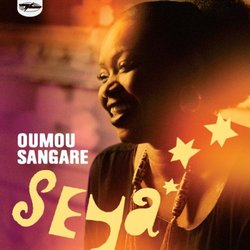| All Artists: Oumou Sangare Title: Seya Members Wishing: 2 Total Copies: 0 Label: Nonesuch Original Release Date: 1/1/2009 Re-Release Date: 6/9/2009 Genres: International Music, Pop Style: Africa Number of Discs: 1 SwapaCD Credits: 1 UPCs: 075597982060, 769233008121 |
Search - Oumou Sangare :: Seya
 | Oumou Sangare Seya Genres: International Music, Pop
Singer and songwriter Oumou Sangare is genuine superstar in her native Mali, and a charismatic performer who has thrilled audiences — around the world with her exhilarating live performances. Her 1990 debut disc Moussolou (... more » |
Larger Image |
CD DetailsSynopsis
Product Description Singer and songwriter Oumou Sangare is genuine superstar in her native Mali, and a charismatic performer who has thrilled audiences around the world with her exhilarating live performances. Her 1990 debut disc Moussolou ('Women' ) released on CD by Nonesuch in 1999 was a sensation in her homeland, as inspiring to many as it was controversial to some. In the lyrics to her songs, Sangare takes up the causes of her fellow Malian women, frankly exploring their problems and unabashedly articulating their desires; the outspokenness of her words are a liberating as her music, which combines traditional instrumentation and rhythms with a sophisticated, funk-driven, contemporary groove. Similarly Requested CDs
|
CD ReviewsHeavy grooves and her vocals are KILLIN' Pharoah S. Wail | Inner Space | 06/11/2009 (4 out of 5 stars) "Oumou has turned a corner. At one point she blurs out lower, rapid fire lines that have the effect of a psychedelic Malian cattle auctioneer. Gone is the syrupy veneer of Laban's (the Africa-only release from which the new tracks on Oumou were culled) heavy-handed production style. Where that one newly focused on keyboards and programmed drums, Seya returns to a more directly human touch. Not at all raw like Radio Mali, but still real. Born of the human connection that only happens when the focus is on human hands creating TONE, much of Seya feels less like a studio album than it does an awesome set of get-down grooves from the main stage at the Festival in the Desert. A few of these tunes still aren't set up the way I'd dream about them, but that's okay. Not everything in this world is built for my pleasure. I focus on what I love, and there is plenty for me to love here. This is the Oumou Sangare album for which I've been waiting since Ko Sira. Her singing here is untouchable. I bought this elsewhere, and early last week I received email confirmation that my order had shipped (!!). I had Seya in my dirty little hands late last week. I don't know the names (or lyrical content) of any of these songs yet. I've only held the digipak once, and that was to take the disc out and put it in the cd player, where it's been spinning 'round and 'round ever since. I've already shed tears to it when she and the band get into the Bliss Zone. This album has quickly turned into one of my favorites from Mali, my longtime favorite country in Africa for modern music. Music like this... Oumou's voice... how are music, art and love at this level not the antidote to war, terrorism, raping, kiling, greed and brutality the world over? I've been in the toilet (emotionally, not literally) over a health situation for quite a while now. Aside from my usual pain, I've felt nothing but joy since this album arrived. Oumou is a gift to us all, and I feel this album places her at a new peak in her artistry. This, Segu Blue and Abacabok are 3 of my favorite Malian albums since Red & Green. (8/9/09 edit: Forget my 4 stars. This is a 5-star album. I loved it from my first listen but it has grown larger and larger with each listen. For more than a month this has been my favorite Oumou album ever.)" Seya - A Joy to Hear! Barry McGloin | Canberra, Australia | 07/08/2009 (5 out of 5 stars) "This is a fabulous album, so musically rich, vocally, instrumentally and lyrically; the production is superb. Savour it and allow it's beauties to unfold. We have been fortunate this year in that two Malian divas have released albums, Rokia Traore with Tchamantche and now this, Seya by Oumou Sangare, each different styles, each excellent. This is Oumou Sangare's fifth release including the Oumou compilation from 2004. She is called the Songbird of Wassoulou, a region south of the Niger known for its music which has developed from traditional hunting songs. On this album Oumou writes her own material, some based upon traditional songs, but make no mistake, this is modern music with modern themes. In her songwriting she assumes the responsibility of her position, as she sees it, by using lyrics to address complex and traditional social issues such as the forced marriages of young girls, emigration, family unity, hope and support within the community and general respect for women. Indeed the song Koundaya is about using God given luck well, as though she reminds herself to do so. The lyrics are rich with metaphor, morality tales, proverbs and local sayings. I imagine that Oumou might have some resistance within her community from conservative elements. Although the lyrics may appear weighty, the overriding impression is one of joy and hope. Seya itself means Joy. The music is exuberant with both male and female call and response, buoyant and colourful with a mix of traditional and modern instrumentation, and above all Oumou's supple, muscular voice sweeps, soars, dives and punctuates. It is a rhythmic vehicle, unforced and natural. She is accompanied by 49 musicians over the 11 tracks, including Pee Wee Ellis, Tony Allen, Cheick Tidiane Seck and Bassekou Kouyate, and the blend of the traditional n'goni, balafon, flutes and percussive instruments with organ, guitar, sax and trombone is organic, not ornate, vibrant but not jarring. The CD is attractively packaged and includes English and French lyrics with an explanation of each song, although not Oumou's singing tongue(s), however you can easily enjoy the music without following the lyrics. If you are new to African music this is an excellent starting point. Mali is blessed with rich music from it's cultural diversity; there are 32 ethnic groups. If you wish to delve further into the variety which Mali offers I suggest you try the following, mainly recent, releases: the late Ali Farka Toure - Savane, Talking Timbuktu(with Ry Cooder), Rokia Taore - Bowmboï, or the latest Tchamantche, Salif Keita - The Mansa of Mali...A Retrospective, or Moffou Bassekou Kouyate and N'goni Ba - Segu Blue Toumani Diabate - In the Heart of the Moon(with Ali Farka Toure), The Mande Variations Amadou & Miriam - the popular Dimanche a Bamako (produced by Manu Chao), or their latest Welcome To Mali(I haven't heard it yet, but it had good reviews), or the desert blues band Tinariwen - Aman Iman: Water is LifeAman Iman: Water Is Life, or Amassakoul. These are all differing styles and all appealing, and this is just Mali! To delve further into 'world music' check out the UK Songlines (with free CD of sample tracks from recent releases) or fRoots (also with CD) magazines and/or the two Rough Guide publications called World Music. There is a whole world of music waiting to enrich your life; get into it !! " "Joy" indeed! Friederike Knabe | Ottawa, Ontario Canada | 09/12/2009 (5 out of 5 stars) "'SEYA', meaning 'joy', Oumou Sangaré's new CD, is a delight to listen to. You could also dance to it! In the title song her warm and even seductive voice celebrates her Mali audiences and fans who she has been entertaining for many years. The eleven songs have a common feel, yet are also quite distinct. A treasure to have and play over and over again.
For me, with SEYA Oumou has reached new heights in musical excellence. While she has continuously performed in Mali since her last CD, Oumou, and also produced a CD for the local market only, we have had to wait six years for a new recording. It was worth the wait for sure! Internationally, Oumou Sangaré had moved into the spotlight and become a household name for Mali music since 1989 with her CDs Moussoulou, Ko Sira, and Worotan(1996), my favourite among the earlier recordings. Oumou is deservedly one of the best known female voices and artists from Mali. She brought Wassoulou music to the international stage. The distinct Wassoulou sound comes from a ethnic region that spans part of South western Mali and neighbouring regions in Guinea and Ivory Coast. The tunes are rooted in traditional griot music, often performed by strong female voices, such as Oumou Sangaré and carrying social messages. Oumou Sangaré, like many other Malian vocal musicians in the 'griot' tradition, takes her popularity as a responsibility to raise social concerns, in particular concerning women, such as forced marriages, polygamy, the need for harmony in domestic partnerships as well as respect for elders and community solidarity. Staying true to her traditional musical style and addressing the important social themes that have always been her preoccupation, the music is at the same time innovative, vibrant and affecting. Her voice has matured and is even richer than before. For this collection, she has assembled an impressive team of backup performers and vocalists, complementing harmoniously her often soft and gentle voice. In partnership with Cheikh Tidiane Seck, who arranged some of the pieces, she has produced a really exquisite album. [Friederike Knabe] " |

 Track Listings (11) - Disc #1
Track Listings (11) - Disc #1







